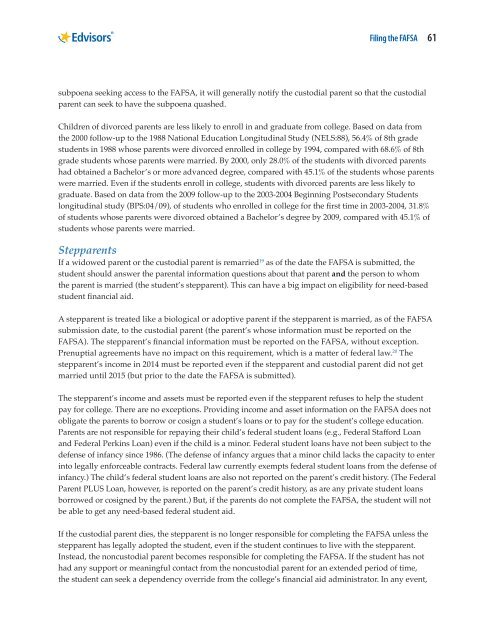filing-the-fafsa-2015-2016-edition
filing-the-fafsa-2015-2016-edition
filing-the-fafsa-2015-2016-edition
You also want an ePaper? Increase the reach of your titles
YUMPU automatically turns print PDFs into web optimized ePapers that Google loves.
Filing <strong>the</strong> FAFSA 61<br />
subpoena seeking access to <strong>the</strong> FAFSA, it will generally notify <strong>the</strong> custodial parent so that <strong>the</strong> custodial<br />
parent can seek to have <strong>the</strong> subpoena quashed.<br />
Children of divorced parents are less likely to enroll in and graduate from college. Based on data from<br />
<strong>the</strong> 2000 follow-up to <strong>the</strong> 1988 National Education Longitudinal Study (NELS:88), 56.4% of 8th grade<br />
students in 1988 whose parents were divorced enrolled in college by 1994, compared with 68.6% of 8th<br />
grade students whose parents were married. By 2000, only 28.0% of <strong>the</strong> students with divorced parents<br />
had obtained a Bachelor’s or more advanced degree, compared with 45.1% of <strong>the</strong> students whose parents<br />
were married. Even if <strong>the</strong> students enroll in college, students with divorced parents are less likely to<br />
graduate. Based on data from <strong>the</strong> 2009 follow-up to <strong>the</strong> 2003-2004 Beginning Postsecondary Students<br />
longitudinal study (BPS:04/09), of students who enrolled in college for <strong>the</strong> first time in 2003-2004, 31.8%<br />
of students whose parents were divorced obtained a Bachelor’s degree by 2009, compared with 45.1% of<br />
students whose parents were married.<br />
Stepparents<br />
If a widowed parent or <strong>the</strong> custodial parent is remarried 19 as of <strong>the</strong> date <strong>the</strong> FAFSA is submitted, <strong>the</strong><br />
student should answer <strong>the</strong> parental information questions about that parent and <strong>the</strong> person to whom<br />
<strong>the</strong> parent is married (<strong>the</strong> student’s stepparent). This can have a big impact on eligibility for need-based<br />
student financial aid.<br />
A stepparent is treated like a biological or adoptive parent if <strong>the</strong> stepparent is married, as of <strong>the</strong> FAFSA<br />
submission date, to <strong>the</strong> custodial parent (<strong>the</strong> parent’s whose information must be reported on <strong>the</strong><br />
FAFSA). The stepparent’s financial information must be reported on <strong>the</strong> FAFSA, without exception.<br />
Prenuptial agreements have no impact on this requirement, which is a matter of federal law. 20 The<br />
stepparent’s income in 2014 must be reported even if <strong>the</strong> stepparent and custodial parent did not get<br />
married until <strong>2015</strong> (but prior to <strong>the</strong> date <strong>the</strong> FAFSA is submitted).<br />
The stepparent’s income and assets must be reported even if <strong>the</strong> stepparent refuses to help <strong>the</strong> student<br />
pay for college. There are no exceptions. Providing income and asset information on <strong>the</strong> FAFSA does not<br />
obligate <strong>the</strong> parents to borrow or cosign a student’s loans or to pay for <strong>the</strong> student’s college education.<br />
Parents are not responsible for repaying <strong>the</strong>ir child’s federal student loans (e.g., Federal Stafford Loan<br />
and Federal Perkins Loan) even if <strong>the</strong> child is a minor. Federal student loans have not been subject to <strong>the</strong><br />
defense of infancy since 1986. (The defense of infancy argues that a minor child lacks <strong>the</strong> capacity to enter<br />
into legally enforceable contracts. Federal law currently exempts federal student loans from <strong>the</strong> defense of<br />
infancy.) The child’s federal student loans are also not reported on <strong>the</strong> parent’s credit history. (The Federal<br />
Parent PLUS Loan, however, is reported on <strong>the</strong> parent’s credit history, as are any private student loans<br />
borrowed or cosigned by <strong>the</strong> parent.) But, if <strong>the</strong> parents do not complete <strong>the</strong> FAFSA, <strong>the</strong> student will not<br />
be able to get any need-based federal student aid.<br />
If <strong>the</strong> custodial parent dies, <strong>the</strong> stepparent is no longer responsible for completing <strong>the</strong> FAFSA unless <strong>the</strong><br />
stepparent has legally adopted <strong>the</strong> student, even if <strong>the</strong> student continues to live with <strong>the</strong> stepparent.<br />
Instead, <strong>the</strong> noncustodial parent becomes responsible for completing <strong>the</strong> FAFSA. If <strong>the</strong> student has not<br />
had any support or meaningful contact from <strong>the</strong> noncustodial parent for an extended period of time,<br />
<strong>the</strong> student can seek a dependency override from <strong>the</strong> college’s financial aid administrator. In any event,


